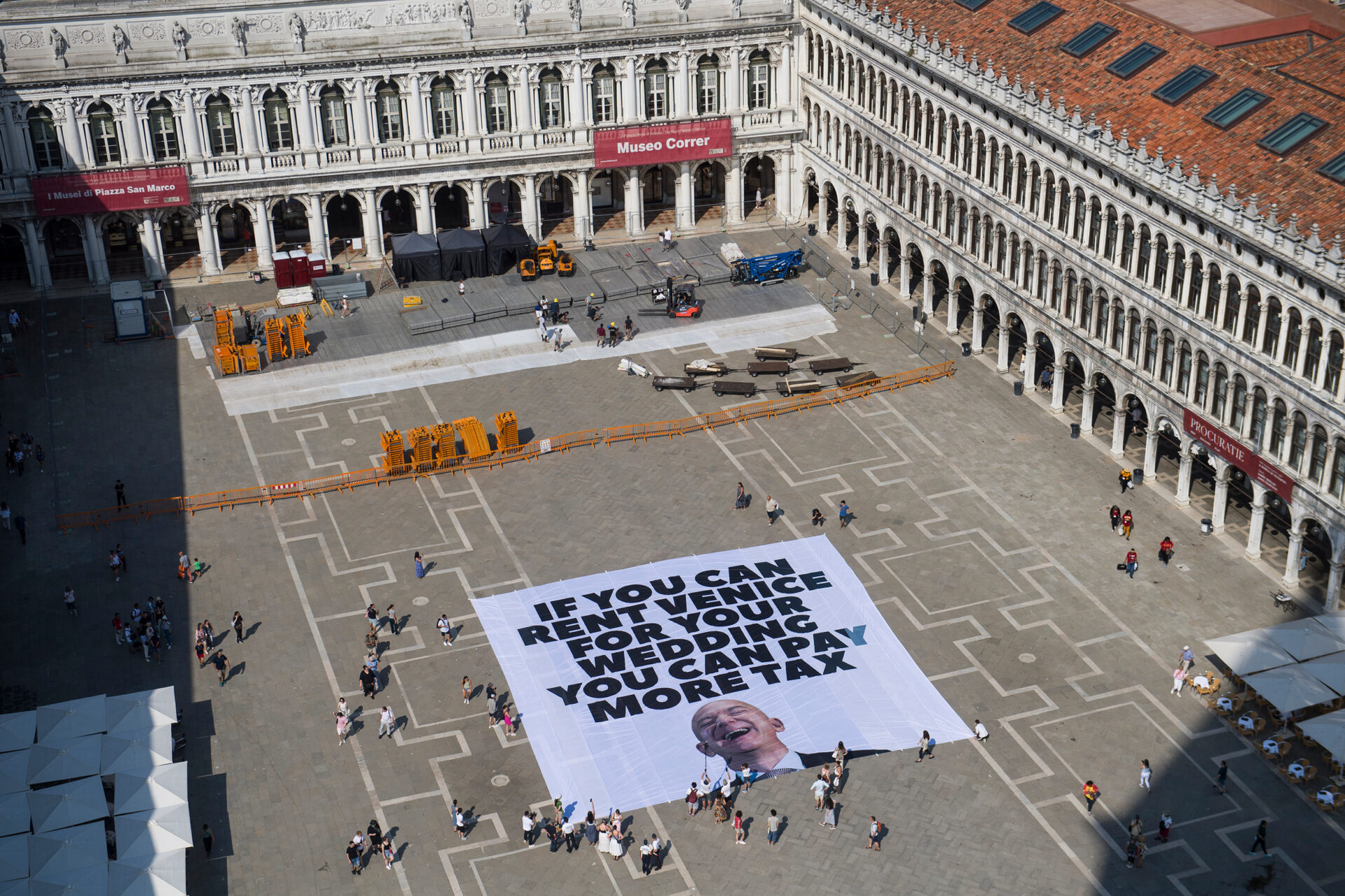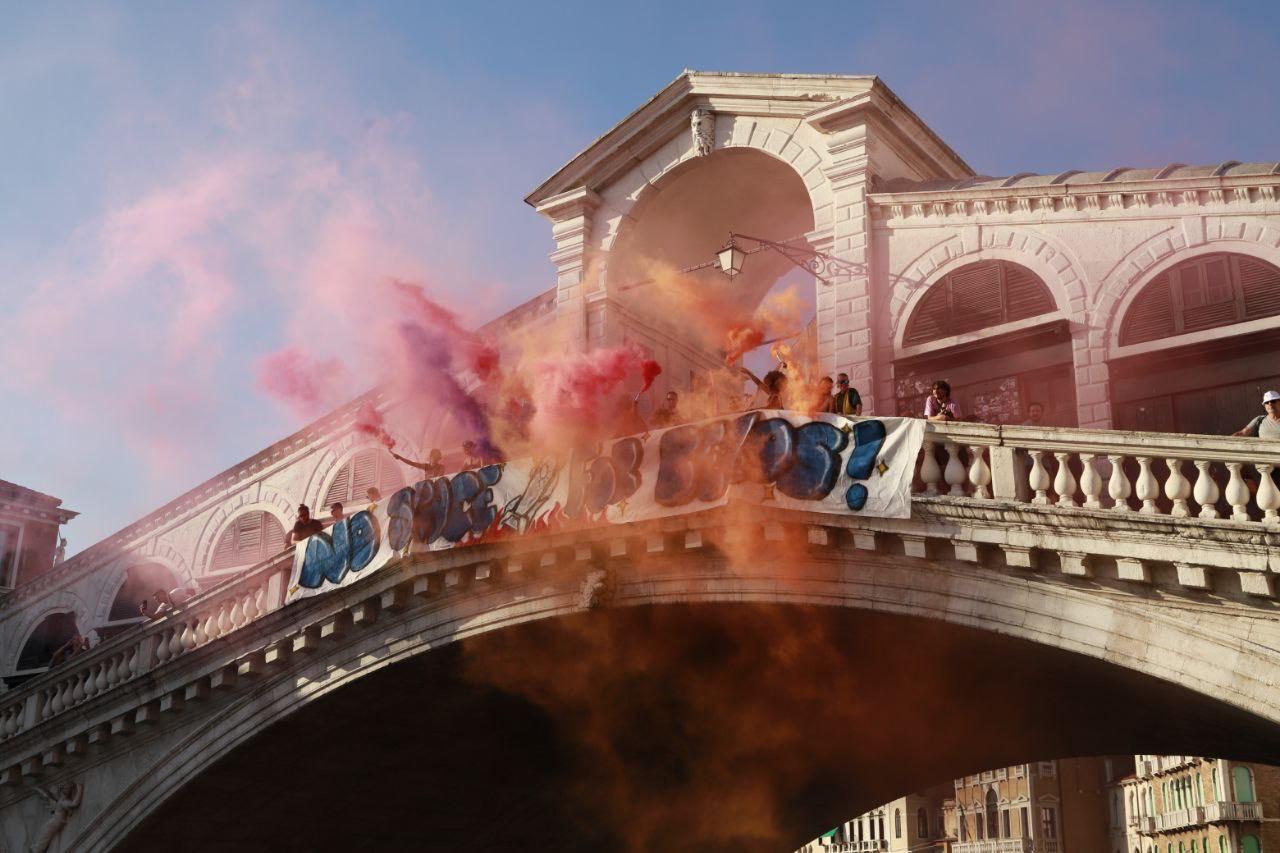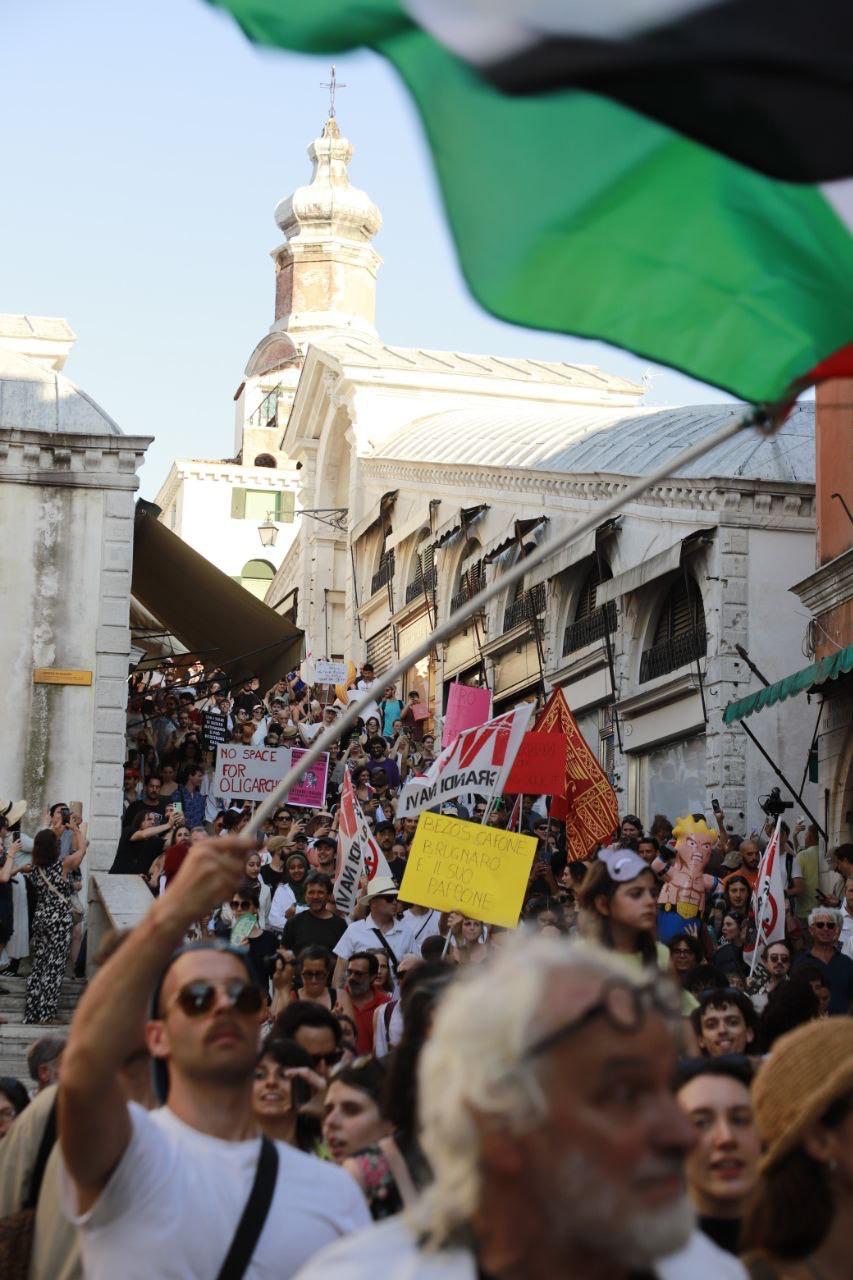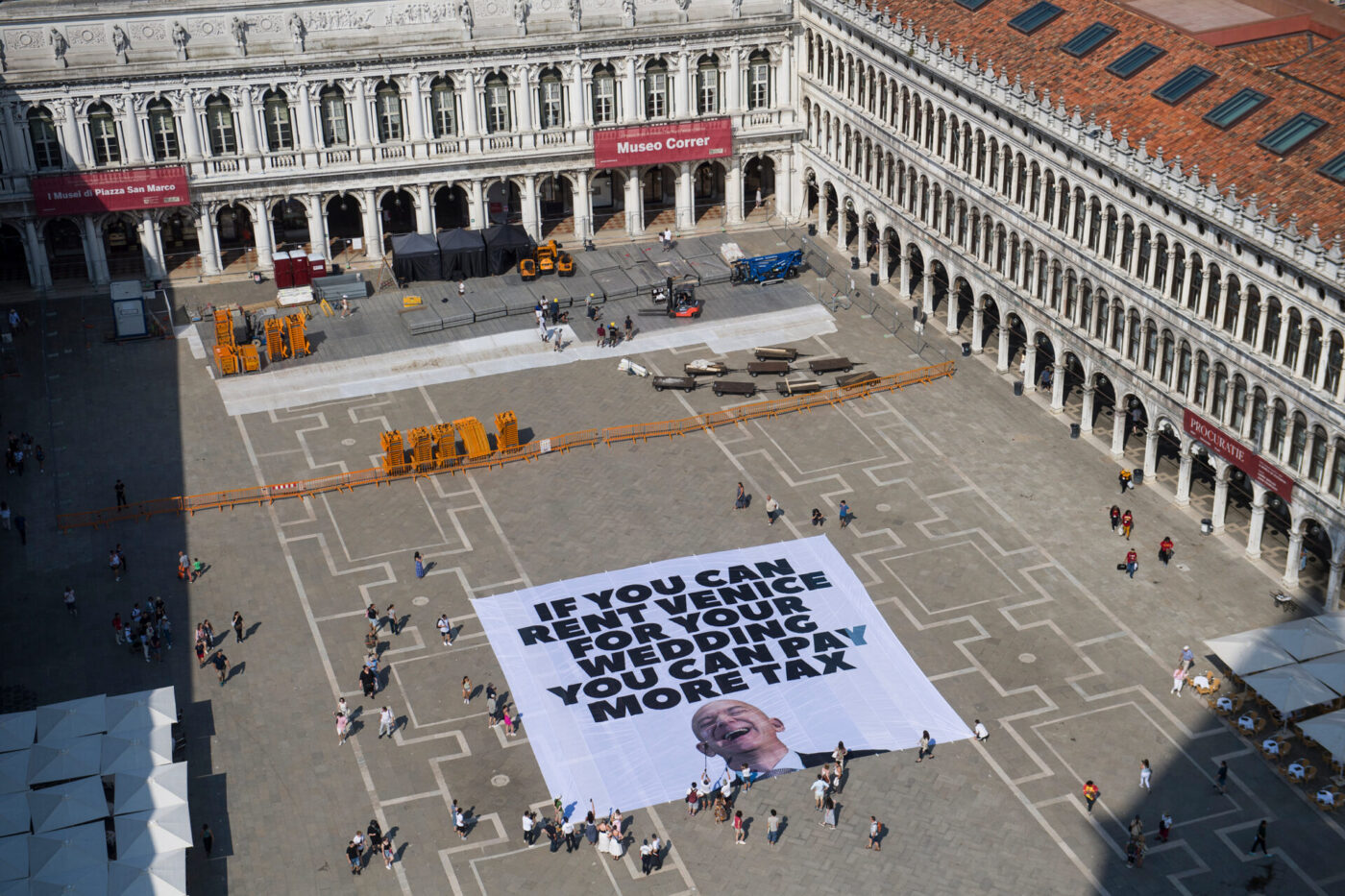Venice has long been the centerpoint of so many of the country’s fiercest issues, from the city’s controversial access fee and its decision to ban cruise ships from the lagoon to its very environmental precarity.
But the arrival of Amazon founder Jeff Bezos’ wedding to former journalist Lauren Sánchez in la Serenissima last week seemed to meld all of these concerns into one: overtourism and the increasing effects of climate change and the selling out of the city to capitalism. The wedding lasted three days, according to CNN reporting, and was a veritable tour of Venice’s hot spots, including Harry’s Bar and San Giorgio Maggiore island, where the ceremony was held. Celebrity guests like Kim Kardashian, Leonardo DiCaprio, and Oprah Winfrey made their entrance, many of whom arrived in the Italian city by private jet. Bezos sold out five of the city’s top hotels and reserved an entire fleet of water taxis for the wedding day, per La Repubblica.
Activists, for their part, saw both an outrage and an opportunity, organizing themselves with a slogan, “No Space for Bezos”, and at least a week of various events that united organizers even from outside of Italy.
“There have been many weddings in Venice,” said Federica Toninello, a 33-year-old activist with the “No Space for Bezos” movement. “The small difference is that they weren’t as impactful as this. …We went to protest against this person who represents everything that is wrong at the moment.”
By mid-week, it was clear that the world had its eyes on Venice, and activists responded in kind by utilizing some of the city’s most visible spots as sites for protest. The bell tower of San Giorgio Maggiore became a space to hang a poster that read “Bezos” with a red “X” crossed out. Greenpeace Italia partnered with the British group “Everyone Hates Elon” to unroll in St. Mark’s Square a 400-square-meter poster, which read: “If you can rent Venice for your wedding, you can pay more tax.” On Saturday, the final day of the wedding festivities, protesters made their way through Venice with signs reading “No Bezos” and boxes emblazoned with the Amazon logo and the word “Rejected.”

Activists from the UK action group Everyone hates Elon and Greenpeace Italy unfolded a giant 20x20m banner reading “If you can rent Venice for your wedding, you can pay more tax” on Piazza San Marco, as Jeff Bezos' celebrated his reportedly multi-million wedding in the lagoon city. Photo courtesy of Greenpeace Italia
Their key victory came when Bezos’ team announced that the couple’s wedding reception would be moved from the Scuola Grande della Misericordia to the Arsenale area—from far more central Venice to a more remote location—in part because of security concerns and in part because of the protesters. Activists had threatened to block the canals and the streets surrounding the venue. The decision was proof that, despite their relative power, economic and otherwise, the protesters were able to make their influence felt on Bezos.
“David and Goliath, power of the people,” Toninello said, “all of us, tiny little ants who have sprung into action.”
But while Bezos was the central figure of the week’s events, protesters were also motivated in some way by the conditions of the city, which has made it difficult to find affordable housing and sustainable work. Twenty-seven-year-old Stella Faye, a university researcher, grew up in Venice and came back after attending university abroad. Her return was as much a political statement as anything else, and she’s had to accept the things she cannot change about the city.
“There are inconveniences. It took me over a year to find a house I could afford. So it’s difficult, but at the same time, it’s a choice I made and I stand by it,” she said. “I don’t want to be just another Venetian who is forced to leave.”
Still, Venice is a city divided, with those who would support the ever-churning tourist economy, and those who would not.
“Precisely because it is within a city that lives and bases its entire economy on tourism, it is inevitable that there will be a segment of people who see tourism and major events as the only solution for this city and who are therefore in favor of it,” Toninello said.
Last week, Federico Blumer, a self-described “cultural influencer,” posted a video to his social accounts arguing that Bezos’ decision to get married in the Italian city was “very cool” and comparing Venice’s own mercantile history to that of Amazon. The wedding was estimated to have an economic impact of as much as €957.3 million, per statistics from the Ministry of Tourism, which was almost 68% of the city’s annual tourist revenue. “When we criticize Bezos, we forget that, thanks to people like him, we have a place like Venice,” Blumer said.
In response to his post, founder of boating school FieAManetta, Marta Canino, took to social media to explain to Blumer the issues with his view and its timing.
“I’m not part of the group of people who organized the protests, but I already know what kind of effect this party will have on the city,” she said in a video response, noting that the rumored economic impact would not actually trickle down to the city’s residents. “It’s nothing positive. The economic aspect is one that will almost remain marginal.”

"No Space for Bezos" protestors on the Rialto; Photo by Leonardo Gava
Others, like Nicoletta Fornaro, a freelance photographer born and raised in Venice, said the problem is not so much with Bezos as with the way the city is run.
“My opinion is that Bezos and the fact that he wanted to have his wedding here and asked for permission to have private areas was not the problem. The authorization was given by the administration,” she said. “I believe that Venice has many problems, and the current administration and those of the previous ones have thought of their own personal interests.”
American travel writer Gillian Longworth McGuire, who lives in Venice, noted that Bezos was the entry-point to talk about some of the bigger issues affecting the city.
“This is a real place where real people live and just do regular, normal things—we’re not against tourism. We want visitors, but we want people that are interested,” she said. “How do you get someone to care about a place?”
While McGuire arrived from out of town on the day of Bezos’ wedding, she said the effects of her daily life were minimal, despite living right next to the Arsenale.
Still, the images of the protesters were so indelible and so prominent—a week’s worth of news about Venice—that those involved hope the city’s administration will be more skeptical the next time around.
“I think this is a very important moment, in that a very strong signal has been sent,” said 29-year-old protester Martina Vergnano. “It has been made very clear that there are things that are not acceptable in this city, and so they will probably think twice before proposing a package of this kind again.”

